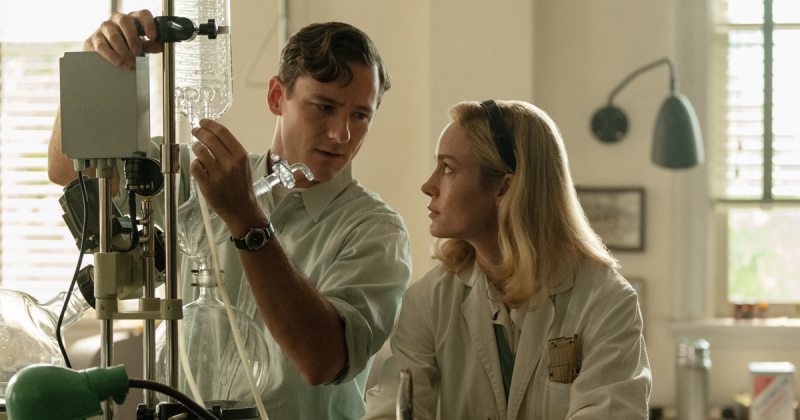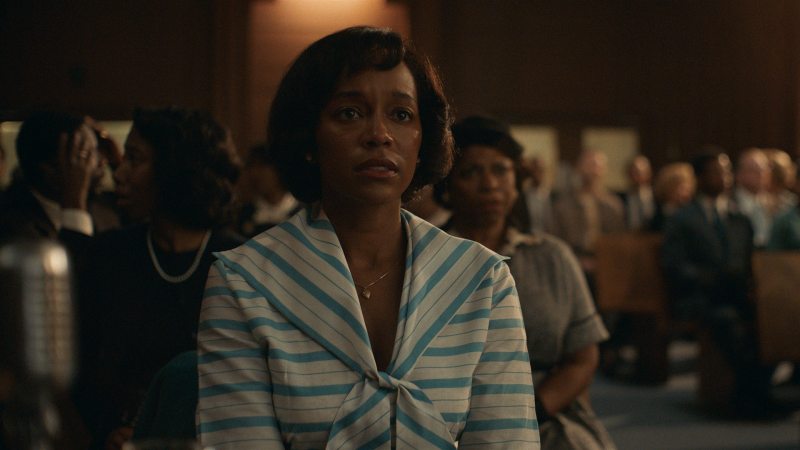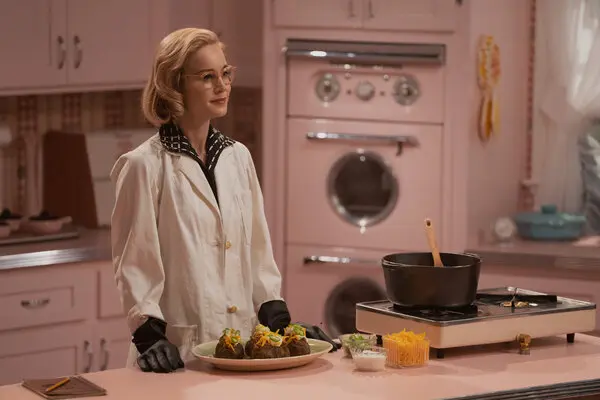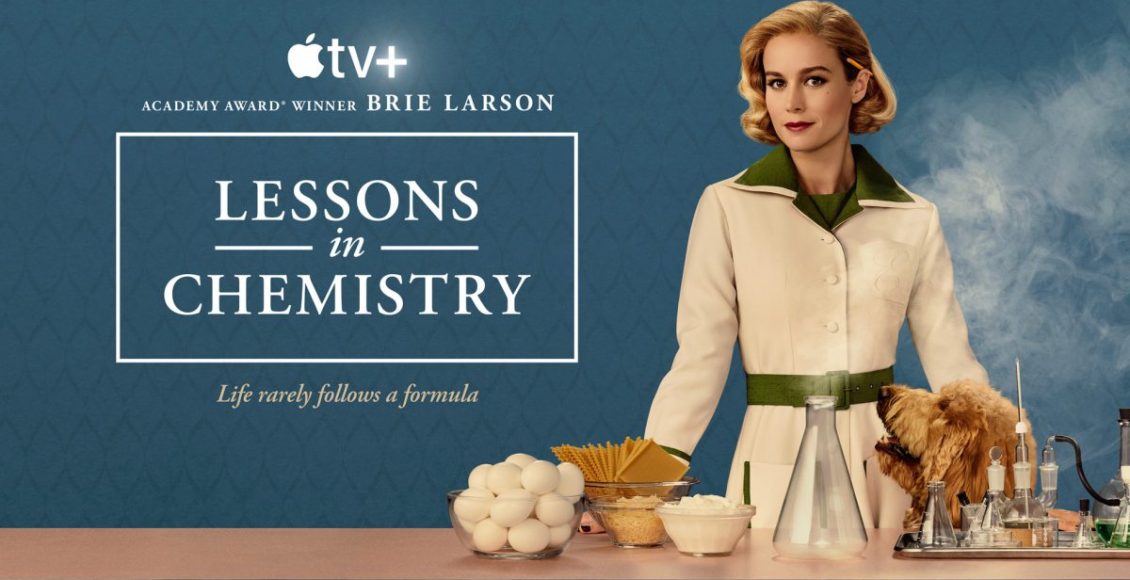Lessons in Chemistry Review (Apple TV+) Series advocating women’s rights starring feminist activist Brie Larson.
Lessons in Chemistry
Summary
In general, this series heavily emphasizes feminism by narrating the story from the perspective of a female scientist suppressed by the male-dominated norms of the 1950s. It provides a glimpse into the challenges faced by women in that era and their opportunities to shine in the television industry. The strong and courageous characteristics, as well as the mindset of the female protagonist, closely resemble the real-life persona of Brie Larson. อiewers who appreciate feminist themes along with other suppressed issues in society might find it appealing, as the series handles these topics exceptionally well. However, it must be acknowledged that the content might be too intense for viewers who do not particularly enjoy these themes. Despite the inclusion of romantic elements, the narrative remains robust and centered around its
Overall
7/10User Review
( votes)Pros
- Focused on feminism in the 1950s through female scientists.
- Brie Larson’s performance is intense and powerful.
- Touches on issues related to people of color, the LGBTQ+ community, and religion.
- Outstanding production quality.
Cons
- Heavy emphasis on feminism to the point where it can sometimes appear exaggerated.
- The ending is straightforward and simple.
Lessons in Chemistry The Apple TV+ series, consisting of 8 episodes, is based on the acclaimed novel by Bonnie Garmus. It introduces the story of ElizaBeth Sott, a female chemist in the 1950s who confronts gender inequality in a laboratory dominated by male scientists. Her life takes a turn when she falls in love with Calvin Evans, a brilliant young chemist with a promising future. However, her path diverges, leading her to become a successful science-based cooking show host that captivates audiences across America.

Lessons in Chemistry Review (No Spoilers)
This series was specifically created for Brie Larson , whose real self aligns clearly with the character in the story. With a strong and assertive personality, she portrays ElizaBeth Sott, a no-nonsense female scientist in the 1950s who neither smiles nor dresses to please men. She remains uninterested in conforming to societal norms that dictate women’s roles in the workplace. The series seems to be a portrayal of her authentic self playing a character in a narrative. On the positive side, this approach makes her performance as this character incredibly authentic and likely resonates well with feminist audiences. The series effectively reflects the challenges of that era, both within the scientific community with few prominent female figures like Madame Marie Curie, and in broader societal issues, questioning the oppression of women in science. The narrative explores these challenges from her early days as a making coffee for the team to obligatory party attendance, illustrating how even as she gains recognition in the television industry, she still faces the same issues. The show highlights the struggle to break free from the constraints imposed by men in a time when women’s rights were not yet widely recognized in society. Even with a successful rating, the boss male still sees her as just a commodity, emphasizing the difficulty of escaping the preconceived notions set by men. The underlying theme revolves around finding a way out of the frameworks imposed during a time when women’s rights were not yet demanded in society. Even among women, traditional values persisted, becoming an obstacle that she had to overcome and learn to navigate in the end.
 From a positive perspective, this women’s rights series deserves a full score because it heavily emphasizes this theme in every episode to the point where viewers almost feel exhausted on behalf of the protagonist. However, on the flip side, the series focuses so much on this aspect that everything ElizaBeth Scott, the main character, does seems almost deliberately contrary to society. While there may be understandable reasons, it feels as if the narrative is intentionally exaggerated to the point where it becomes more of a fiction than a realistic portrayal. For example, the ongoing debate about why a TV show host must smile, even if it’s a nerd of any degree, is presented in an overly dramatized manner. Many issues in the series are excessively emphasized. Even as a scientist with a master’s degree, it seems unrealistic for her character to question such basic aspects. This makes the entire story appear as if the character is constantly resisting everything, and with Brie Larson playing the role, it feels like she’s doing it to sell this aspect specifically. Viewers who are critical of this portrayal may not appreciate it, while those who enjoy it would likely admire Larson’s performance.
From a positive perspective, this women’s rights series deserves a full score because it heavily emphasizes this theme in every episode to the point where viewers almost feel exhausted on behalf of the protagonist. However, on the flip side, the series focuses so much on this aspect that everything ElizaBeth Scott, the main character, does seems almost deliberately contrary to society. While there may be understandable reasons, it feels as if the narrative is intentionally exaggerated to the point where it becomes more of a fiction than a realistic portrayal. For example, the ongoing debate about why a TV show host must smile, even if it’s a nerd of any degree, is presented in an overly dramatized manner. Many issues in the series are excessively emphasized. Even as a scientist with a master’s degree, it seems unrealistic for her character to question such basic aspects. This makes the entire story appear as if the character is constantly resisting everything, and with Brie Larson playing the role, it feels like she’s doing it to sell this aspect specifically. Viewers who are critical of this portrayal may not appreciate it, while those who enjoy it would likely admire Larson’s performance.

However, it is noteworthy that the series doesn’t solely focus on ElizaBeth Scott’s story. It also delves into the narrative of the male character, Calvin Evans, a young chemist with a unique personality who falls in love with her. His storyline is crucial in shaping ElizaBeth Scott’s character and influencing her perspective on life and love. The series dedicates entire episodes to recounting his life from childhood to adulthood, providing insight into the experiences that made him different from the societal norms of that time. The narrative addresses themes such as the conflict between religious beliefs and science through a series of letters exchanged between characters, showcasing true friendship despite differing opinions. It also explores ElizaBeth Scott’s childhood, presenting issues related to homosexuality within a religious Christian family. Another episode introduces a character from the perspective of a dog, relating to significant events in the series. Additionally, there is a subplot involving a black female neighbor leading protests against the exploitation of black individuals to build roads. While these supplementary storylines involve ElizaBeth Scott to some extent, they are not the central focus. Expanding the series to include multiple perspectives has made it more multi-faceted than merely presenting a continuous narrative on feminism alone.
 And with the production work of Apple TV+, this period drama excels in capturing every detail of the 1950s, from the tools used and wardrobe choices to the hairstyles. The TV is still in black and white, the studio operates with old-fashioned cameras, and scenes are set in vintage-style rooms. The production authentically showcases the details of the era. However, during this period, the narrative content doesn’t delve as much into the behind-the-scenes of the television production. Instead, it focuses more on telling the life stories of the main character and other individuals. It’s not until the later episodes that the storyline transitions into the realm of cooking shows.
And with the production work of Apple TV+, this period drama excels in capturing every detail of the 1950s, from the tools used and wardrobe choices to the hairstyles. The TV is still in black and white, the studio operates with old-fashioned cameras, and scenes are set in vintage-style rooms. The production authentically showcases the details of the era. However, during this period, the narrative content doesn’t delve as much into the behind-the-scenes of the television production. Instead, it focuses more on telling the life stories of the main character and other individuals. It’s not until the later episodes that the storyline transitions into the realm of cooking shows.

In general, this series heavily emphasizes feminism by narrating the story from the perspective of a female scientist suppressed by the male-dominated norms of the 1950s. It provides a glimpse into the challenges faced by women in that era and their opportunities to shine in the television industry. The strong and courageous characteristics, as well as the mindset of the female protagonist, closely resemble the real-life persona of Brie Larson. อiewers who appreciate feminist themes along with other suppressed issues in society might find it appealing, as the series handles these topics exceptionally well. However, it must be acknowledged that the content might be too intense for viewers who do not particularly enjoy these themes. Despite the inclusion of romantic elements, the narrative remains robust and centered around its core themes.

